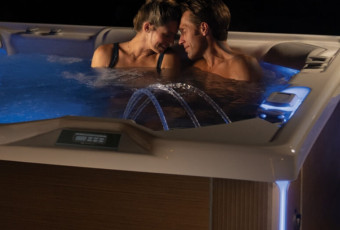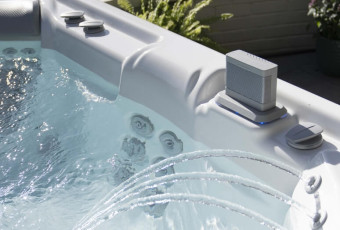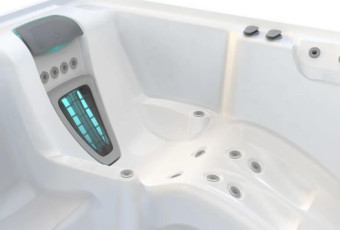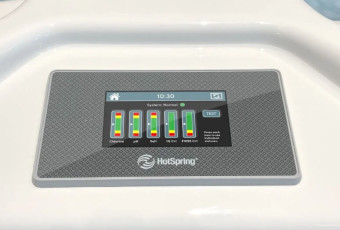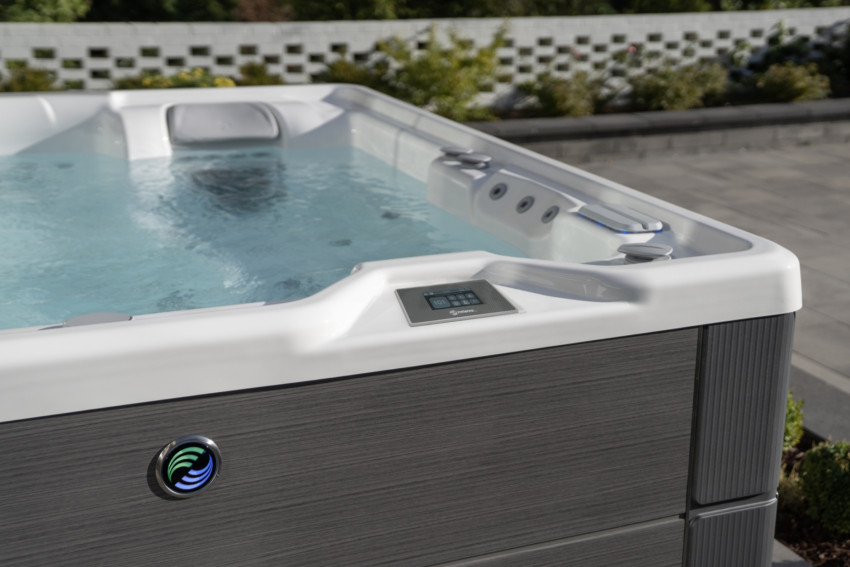We have all heard of chlorine in water. We all know that it goes into swimming pools and hot tubs.
But, do you know much more than that?
Why should you put chlorine in water, what function does it perform in my spa pool and will any chlorine do?
All good questions and the answer is simple. Chlorine plays a very important role in maintaining your spa pool water. Especially since it is responsible for sanitising the spa pool, preventing any health problems from occurring and keeping your spa pool water look the way it should.
What is Spa Pool Chlorine?
Chlorine itself is naturally occurring element and is a gas at room temperature. It's disinfectant properties are used in many mediums because of its effectiveness.
Of course, it is a little hard to apply a gas to your spa water, which is why all chlorine products are a compound mixture. The bulk of the solution is chlorine and the rest is comprised of stabilising and binding agents.
Most spa pool chlorine comes in granule form. You add the granules to your spa pool where they dissolve and sanitise the water.
Why You Should Use Chlorine in Your Spa Pool?
Warm water provides the perfect environment for bacteria and other microorganisms to grow which are harmful to our health. If you do not regularly clean your spa pool water, then you run the risk of it becoming contaminated with bacteria.
This can lead to skin, ear and eye infections, gastro bugs or respiratory infections. People with compromised immune systems, the elderly or the very young are particularly at risk from contaminated spa pool water.
It is for this reason why regularly using quality spa chlorine in water will help sanitise it and keep it free from nasty bacteria and germs. It also helps to remove body fats and oils after a spa pool soak, ensuring your spa pool water stays clean and safe for everyone to soak in.
What happens if my spa pool has too much chlorine in it?
In the case of chlorine, you can have too much of a good thing. Not enough chlorine will result in a far less comfortable and potentially dangerous soak, and the same can be said for too much chlorine.
The waters of an over-chlorinated spa pool will be too alkaline. This alkalinity will first announce itself with a pungent bleachy smell, but if you wade into the waters you may also experience:
- Dry, itchy and irritable skin
- Dry, discoloured hair
- Rashes and hives
- Eye irritation
- Coughing
- Throat and lung irritation
- Asthma
The good news is these reactions are just that – reactions – and will generally wear off as soon as you step out of the over-chlorinated water.
How can too much chlorine damage my spa pool?
Unfortunately the effects of over-chlorination extend beyond itches and irritation. Chlorine acts as a corrosive when concentrated, so too much chlorine can do real damage to your spa by eating away at the shell, jets and internal piping and machinery.
Exposed metal is most at risk when there’s too much chlorine in a spa. While spa pools made from high quality materials (like Hot Spring swim machines) are better protected against too much chlorine, that extra protection only goes so far. If you want to keep enjoying your spa pool for years or even decades to come, it’s wise to be very careful when adding spa pool or swim spa chlorine granules.
How to lower chlorine levels in a hot tub or spa pool
Let’s say that for whatever reason – a mistake in your calculations, miscommunication with a partner, an accidental spill – there is now too much chlorine in your spa pool. What can you do to reduce the concentration? Happily there are a few ways to deal with this issue:
- Expose to sunlight: Chlorine degrades, so the concentration will lower naturally over time, but one of the most effective ways to speed up this breakdown is with simple sunlight, so leave the cover off.
- Turn on the heater: Bacteria multiply faster in warm environments. By turning your heater and giving bacteria its favourite conditions, more chlorine will be used to neutralise the growing surge of invaders. Keep in mind that if you use this method you’ll need to keep a close eye on your spa pool to ensure bacteria doesn’t win the battle.
- Dilute: Partially draining your spa pool and adding fresh water will dilute the amount of chlorine in your spa. Only in the most serious of circumstances will you need to completely drain and refill.
- Add chlorine neutraliser: The most efficient and effective way to reduce the concentration of chlorine in your spa pool is with a purpose-built chlorine neutraliser compound. Simply add the chemical to your water per the instructions on the packet, and your water will soon be ready to soak!
How Does Chlorine in Spa Pool Water Kill Bacteria?
Chlorine is excellent at creating an environment that is inhospitable for microorganisms. It does this through a simple chemical reaction.
When you put chlorine in spa pool water, it mixes with the liquid causing the granules to dissolve and create a solution of different chemicals. These chemicals are mild enough for humans to use, but not so mild for bacteria.
In fact, chlorine destroys the key parts of the microorganisms. They start with attacking the cell walls, then move onto destroyng the enzymes within the cell, including the nucleic acids and membranes. This process neutralises any bacteria present in the spa water making it harmless.
The whole process takes around 30 minutes to complete, which is why it is recommended you don't use chlorine right before you want to have a soak.
Once the chemicals have competed the cleaning process, they gradually break down over time. Exposure to sunlight accelerates this process. Because the chemicals do break down, you need to add chlorine products on a regular basis to ensure the cleaning process continues.
You will need to maintain the right chlorine and pH levels to keep your spa pool sanitised.
What Does Chlorine Do To the pH Level?
The water in your spa pool should have a certain pH level to be safe. The pH level describes how acidic your spa water is. You want to keep it in the right range so it remains safe for soaking.
The pH scales ranges from 0 to 14 with 7 being the neutral point. Measure below 7 means your spa water is too acidic. For chlorine to be its most effective, the pH level should fall within 7 and 8 with the ideal reading being 7.4. This is the same pH level as human tears.
Adding chlorine granules to your spa pool water can affect the pH level. It is the hypochlorous acid and hypochlorite ions that cause the change. If the pH level is too high then it means that there is not enough hypochlorous acid present. As this is the faster acting chemical of the two, it can mean the spa cleaning will take a lot longer than it should.
You will need to test your pH levels on a regular basis. If you need help with this, please visit us in our Hot Spring showroom and we'll happily show you how. 
Not All Chlorine Is Created Equally
The broad term "chlorine" can cause some confusion when it comes to choosing the right product for your spa pool since not all chlorine products are made the same.
The spa pool chlorine recommended for spas is a gentle granular mix known as Sodiumdichlor. Unfortunately, Sociumdichlor is often confused with another type of granular chlorine known as Calcium hypochlorite. As the name suggests, it contains calcium. Spa pools and high levels of calcium do not mix well. In fact, using calcium-based chlorine product will cause your spa pool heater and other metal parts of your spa pool to fail due to the build up of scale on the heating element.
This is why calcium hypochlorite is not recommended safe for spa chlorine rather it should only be used in swimming pools.
What Are The Best Spa Chemicals To Use For My Spa Pool?
Choosing the right spa pool chlorine is important to ensure your water is properly cleaned and you prolong the life your spa pool for years to come.
But how do you know what chlorine products to choose?
Luckily, we can answer that question for you. Here at Hot Spring Spas we recommend the FreshWater Concentrated Chlorinating Granules. They have been designed specifically for use in spa pools and are completely soluble and are nearly pH neutral.
Other household brands available from non-specialist retailers like hardware stores include low quality binders and fillers. While they may be cheaper, they are not as effective in killing bacteria. They can also leave a nasty residue. This residue is what can damage your spa and it's working components. It can also leave a "tide line" meaning more surface cleaning.
The generic brands also tend to be more calcium-based, so are designed for swimming pools not spa pools.
The FreshWater Granules use a sodium based binder, so that they dissolve quicker in the water. Because they only take about 30 seconds to dissolve, bacteria killing begins almost instantly. Calcium based counterparts can take several hours to dissolve. They should never be used in spa pools.
How Much Chlorine Should I Use In My Spa Pool?
By choosing FreshWater Granules with your spa pool, you make the job of chlorinating an easy one. Depending on your spa pool size, it's estimated based on 1000L spa that you may need to add 1/2 teaspoon (half of 10g teaspoon) of the granules after every spa session. Then retest and add as necessary.
This is so much simpler than traditional chlorine application methods. With these, you would need to avoid any steam when opening the spa cover (for risk of inhaling Legionnaires disease toxins) and add the chlorine in the spa water well before and after you spa soaking to ensure the water is safe.
Is Chlorine Harmful For My Spa?
If you choose FreshWater Chlorinating granules and follow our best practice instructions for use, then you should not have any issues with chlorine damaging your spa pool.
However, if you do not use the right type of chlorine or you use too much, then you could run into problems like some spa pool owners.
They purchased a spa pool 6 or so years ago. Despite repeated recommendations, they continued to use pool chlorine in their spa pool. Unfortunately, spa pools are not designed to withstand chemicals of this strength. The use of the pool chlorine caused major components to break down.
Even worse news for the spa owner because they had used an unapproved sanitiser in their spa the warranty is no longer valid.
Aside from the damage to the spa, using too many spa chemicals can create that distinctive and unpleasant "chlorine smell" as well as skin and eye irritation.
There are different types of chlorine on the market and not all of these products are suitable for spa pools. For instance, pool chlorine (typically sodium hypochlorite) is a lot stronger than the same type of chlorine used for spas.
If you had to think of a practical example, think of household bleach in relation to industrial strength bleach. It is essentially the same chemical compound, but it is used in different environments due to its differing product strengths.
Want To Take The Guesswork Out Of Chlorine?
Choosing the right chlorine brand and knowing how much to have on hand can be tricky. Luckily, we have taken the guesswork out of spa pool cleaning for you.
Join our Silver Ion Loyalty System and have everything you need to keep your spa clean and healthy delivered to your front door - hassle free
The Complete package includes FreshWater Chlorine Granules, pH balancer , a silver ion cartridge and filter cleaner - best part it arrives at your doorstep like clockwork. You can also cancel, postpone or change your subscription at any time.
With three different discounted bundles available and automated delivery every 4 months, you'll never have to wonder about your spa products again.
On a regular basis we suggest you have your pool water electronically tested in store by a professional.
If you need any further assistance or advice please get in touch with our team, we're always here to help.

